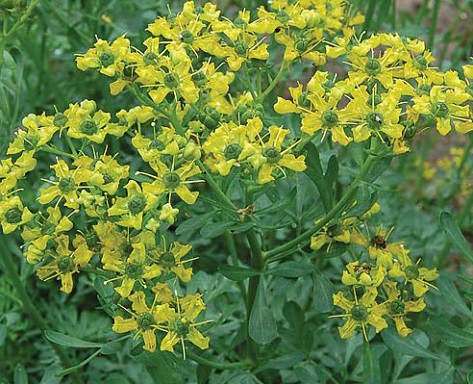Potential of Rue herb in treating COVID-19 explored by a team of international researchers
Nikhil Prasad Fact checked by:Thailand Medical News Team Oct 11, 2024 1 year, 2 months, 2 weeks, 2 days, 10 hours, 13 minutes ago
Herbs And Phytochemicals: An international team of researchers from recently investigated the potential of Rue herb (Ruta graveolens) as a treatment for COVID-19, caused by the SARS-CoV-2 virus. This
Herbs And Phytochemicals news report highlights the key findings from the study, which focused on evaluating certain compounds found in this herb and their effectiveness in inhibiting the virus's activity. The study brings hope that natural remedies like Rue herb could one day complement or enhance the range of treatments available for COVID-19.
 Collaborative Research Efforts
Collaborative Research Efforts
The research team involved scientists from several prestigious institutions. These include the Department of Genetic Engineering and Biotechnology at Jashore University of Science and Technology, Bangladesh; the Department of Pharmacognosy at King Saud University, Saudi Arabia; and the International Graduate Program of Veterinary Science and Technology, Chulalongkorn University, Thailand. Additional contributors were from Liverpool John Moores University, UK; Carnegie Mellon University, Qatar; and Texas A&M University, Qatar.
How SARS-CoV-2 Infects Human Cells
SARS-CoV-2, the virus responsible for COVID-19, is known for its ability to invade human cells by using its spike protein to latch onto the ACE2 receptor in human cells. This interaction facilitates the entry of the virus, allowing it to spread and replicate in the body, which leads to infection. Blocking this interaction could be a key method in preventing the virus from causing illness.
The Role of Rue Herb
Rue herb has been traditionally used in various cultures for its medicinal properties, including treating pain and inflammation. However, its potential use in combating viral infections, including SARS-CoV-2, had not been fully explored until now. In this study, researchers aimed to identify compounds within the Rue herb that could inhibit the spike protein of the virus, potentially preventing it from binding to human cells and thus halting the infection process.
The Search for Active Compounds
The team began by screening 53 different compounds found in Rue herb, using a combination of advanced computer simulations and laboratory experiments. Twelve of these compounds were identified as potential inhibitors of the virus’s spike protein. Among them, four stood out due to their strong binding energies, which suggest a greater ability to interfere with the spike protein and potentially inhibit the virus.
Key Compounds Identified
The four promising phytochemical compounds identified in Rue herb were Amentoflavone, Agathisflavone, Vitamin P, and Daphnoretin. These compounds were chosen based on their molecular docking scores, which indicate how effectively they might bind to the spike protein. Their respective binding energies were -9.2, -8.8, -8.2, and -8.0 kcal/mol, demonstrating a strong potential to block the virus's entry into human cells.
Pharmacokinetic and Toxicity Profi
les
The study also evaluated the pharmacokinetic properties of these compounds, which include their ability to be absorbed, distributed, metabolized, and excreted by the body. In addition, their toxicity profiles were assessed to ensure they would not cause harm to humans if used as a treatment. The compounds showed favorable results in terms of both safety and efficacy, with low toxicity levels and good pharmacokinetic properties. This is important because any potential treatment must be both safe and effective before it can be considered for widespread use.
Laboratory Testing Confirms Potential
In laboratory tests, extracts from the Rue herb containing the four key compounds showed promising antiviral activity. These extracts were able to inhibit the virus at a concentration of 1.299 mg/mL, with minimal toxic effects on human cells, further supporting the potential use of Rue herb compounds as a treatment option.
Molecular Simulations Provide Insights
Molecular simulations, which allow scientists to observe how molecules interact at an atomic level, confirmed the stability of the selected compounds when they bind to the spike protein. This adds further weight to the potential effectiveness of Rue herb compounds in preventing SARS-CoV-2 from infecting human cells. The simulations also revealed unique movement patterns of the compounds when interacting with the spike protein, providing valuable insights into their functional behaviors.
Why This Research is Important
While vaccines and treatments for COVID-19 have been developed, there is still a need for additional therapeutic options, particularly those that can be used to prevent the virus from entering cells in the first place. This study offers hope that natural compounds, such as those found in Rue herb, could play a role in developing new treatments for COVID-19.
Conclusion
The research suggests that compounds derived from the Rue herb - especially Amentoflavone, Agathisflavone, Vitamin P, and Daphnoretin - may be effective in inhibiting the SARS-CoV-2 virus by blocking its ability to bind to human cells. These compounds have demonstrated both antiviral activity and low toxicity, making them strong candidates for further study and potential therapeutic use. The stability of these compounds, observed through molecular simulations, adds to their promise as a treatment option. While more research is needed, this study provides a strong foundation for the development of Rue herb-based therapies for COVID-19.
The study findings were published in the peer-reviewed journal: International Immunopharmacology.
https://www.sciencedirect.com/science/article/pii/S156757692401840X
For the latest on
Herbs And Phytochemicals, keep on logging to Thailand Medical News.
Read Also:
https://www.thailandmedical.news/news/the-phytochemical-oleandrin-shows-promise-in-combating-both-cancer-and-covid-19-by-targeting-grp78
https://www.thailandmedical.news/news/south-korean-researchers-identify-amentoflavone-from-selaginella-tamariscina-as-a-potential-inhibitor-of-the-covid-19-virus
